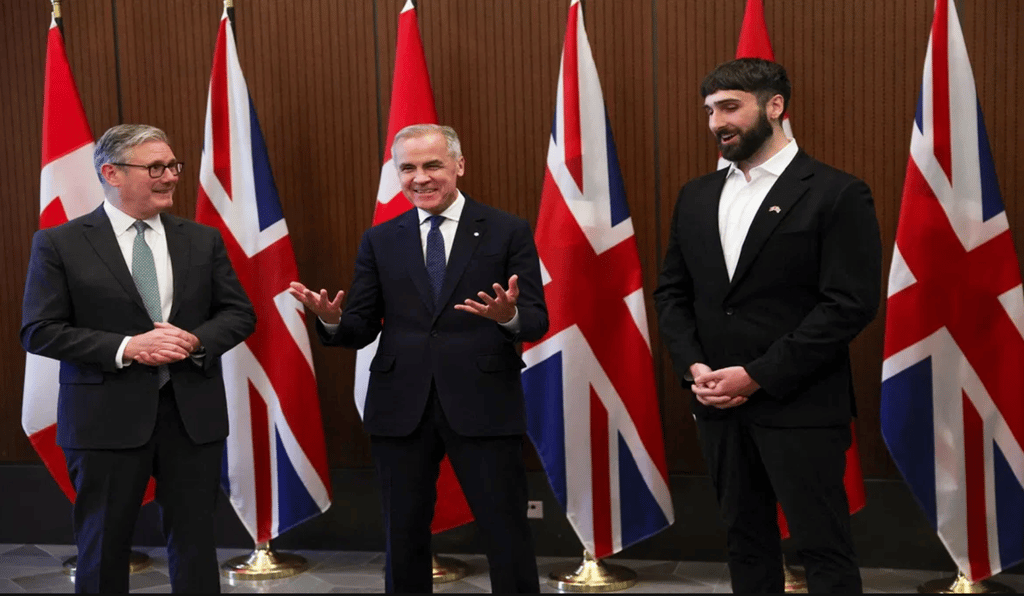Israel-Iran Conflict: A Deepening Crisis Overshadows the 2025 G7 Summit
6/17/20254 min read


Israel-Iran Conflict: A Deepening Crisis Overshadows the 2025 G7 Summit
Posted on June 16, 2025, in News & Politics | U.S. News & Politics at Boncopia.com
The 2025 G7 summit in Canada’s Kananaskis, Alberta, intended to focus on global economic stability and critical mineral supply chains, has been eclipsed by escalating tensions between Israel and Iran. This intensifying conflict, coupled with U.S. President Donald Trump’s trade war, has shifted the summit’s dynamics, turning it into a series of bilateral negotiations rather than a unified platform. Below, we explore the Israel-Iran conflict’s historical roots, recent developments, global implications, and its impact on the G7 summit, offering a clear and engaging analysis for readers.
Historical Context: A Long-Simmering Rivalry
The Israel-Iran conflict traces back to Iran’s 1979 Islamic Revolution, which transformed the nation from an Israeli ally into a fierce adversary. Iran’s support for groups like Hezbollah in Lebanon and Hamas in Gaza, part of its “Axis of Resistance,” has fueled a proxy war against Israel. Israel, viewing Iran’s nuclear ambitions and regional influence as existential threats, has responded with covert operations, including cyberattacks and assassinations of Iranian nuclear scientists.
Tensions escalated after Hamas’s October 7, 2023, attack on Israel, which killed nearly 1,200 people, mostly civilians, sparking the Gaza war. Iran’s backing of Hamas and Hezbollah intensified Israel’s targeting of Iranian proxies in Syria and Lebanon. By April 2024, direct confrontations emerged when Israel bombed an Iranian consulate in Damascus, killing senior Iranian officials. Iran retaliated with missile and drone strikes on Israel, most of which were intercepted with U.S., U.K., French, and Jordanian support.
The 2025 Escalation: Operation Rising Lion
On June 13, 2025, Israel launched “Operation Rising Lion,” a large-scale aerial assault targeting Iranian nuclear facilities, missile sites, and military leadership. The operation, coordinated by the Israel Defense Forces (IDF) and Mossad, struck over 100 targets, including the Natanz nuclear site and facilities in Isfahan and Tehran. Key Iranian figures, such as Revolutionary Guard commander Hossein Salami and intelligence chief Mohammad Kazemi, were killed, alongside nuclear scientists. Iran reported 224 deaths, predominantly civilians, and over 1,200 injuries.
Iran retaliated with missile and drone barrages on Israeli cities like Tel Aviv and Haifa, killing at least 24 people and injuring nearly 600 by June 16. The strikes damaged civilian infrastructure, including a residential building in Petah Tikva and a power plant in Haifa. Israel’s Iron Dome, supported by U.S. assistance, intercepted many projectiles, but some broke through, causing significant damage.
By June 16, the conflict entered its fourth day, with Israel claiming aerial superiority over Tehran and ordering evacuations in parts of the city. Iran’s Foreign Minister Abbas Araghchi accused the U.S. of complicity, citing Trump’s public acknowledgment of the attacks, and vowed “decisive and proportional” responses.
Global Implications and G7 Dynamics
The Israel-Iran conflict dominated the G7 summit, undermining its agenda. Leaders, including Canadian Prime Minister Mark Carney, British Prime Minister Keir Starmer, and European Commission President Ursula von der Leyen, sought to de-escalate tensions through diplomacy. Starmer, who had spoken with Trump and Israeli Prime Minister Benjamin Netanyahu, urged restraint, while the U.N. and Pope Leo XIV called for dialogue.
However, Trump’s mixed signals—calling for peace while suggesting “sometimes they have to fight it out”—complicated efforts. His administration’s support for Israel, including missile defense aid, contrasted with his reluctance to engage militarily, reflecting domestic pressure from his “America First” base, wary of Middle East entanglements.
The conflict’s economic fallout, including disrupted oil supplies and a plummeting Iranian rial, raised fears of a global recession. Iran’s strikes on Israeli energy infrastructure and Israel’s targeting of Iranian oil depots, like Shahran, spiked oil prices, impacting G7 economies.
Trump’s Trade War: A Parallel Challenge
Compounding the summit’s challenges, Trump’s tariff threats strained G7 unity. His “reciprocal” tariffs, paused until July 9, prompted leaders to seek bilateral deals to avoid economic fallout. Canada, facing 7% unemployment linked to the trade war, and the EU, reliant on U.S. trade, prioritized these talks. Trump’s provocative remarks, like suggesting Canada become the “51st state,” further strained relations, with French President Emmanuel Macron’s Greenland visit signaling defiance.
Potential Outcomes and Challenges
The Israel-Iran conflict risks a broader regional war, potentially involving U.S. forces despite Trump’s hesitance. Iran’s weakened proxies, like Hezbollah, limit its retaliation options, but attacks on U.S. bases or oil routes could escalate tensions. Israel’s goal of dismantling Iran’s nuclear program faces hurdles, as key sites like Fordow remain intact.
Diplomatically, Iran’s offer to resume nuclear talks if Israel halts attacks faces skepticism, given Trump’s withdrawal from the 2015 nuclear deal. The G7’s push for de-escalation may hinge on Trump’s influence over Israel, but his unpredictable stance leaves outcomes uncertain.
Looking Ahead
The G7 summit underscores a fractured global order, with the Israel-Iran conflict and trade tensions exposing the group’s challenges. As Carney navigates these crises, the absence of a joint communiqué reflects the difficulty of achieving consensus. The coming days will test whether diplomacy can prevail or if the conflict will spiral further, reshaping the Middle East and global economy.
Thought Questions for Readers
Can the G7 effectively mediate the Israel-Iran conflict, or will bilateral talks with Trump dominate future diplomacy?
How should the U.S. balance its support for Israel with avoiding a wider Middle East war?
What are the long-term economic impacts of the Israel-Iran conflict on global energy markets and G7 economies?
Sources: Associated Press, Reuters, NPR, BBC, The New York Times, The Guardian, Al Jazeera, The Economist, CBS News, Wikipedia, CSIS
hello@boncopia.com
+13286036419
© 2025. All rights reserved.